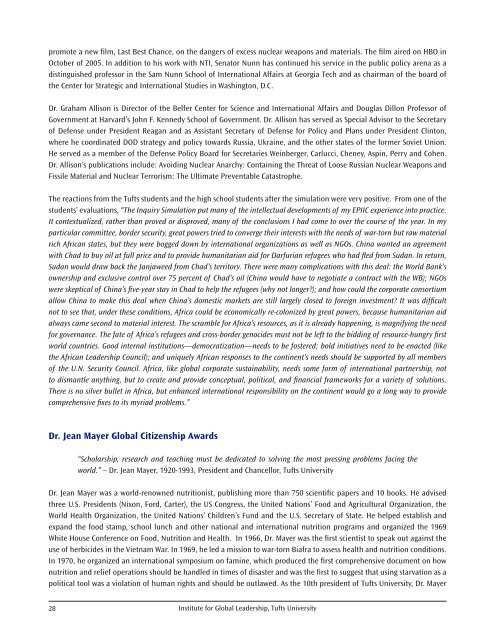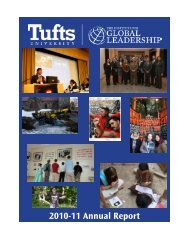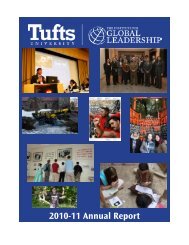Download - Institute for Global Leadership
Download - Institute for Global Leadership
Download - Institute for Global Leadership
Create successful ePaper yourself
Turn your PDF publications into a flip-book with our unique Google optimized e-Paper software.
promote a new film, Last Best Chance, on the dangers of excess nuclear weapons and materials. The film aired on HBO in<br />
October of 2005. In addition to his work with NTI, Senator Nunn has continued his service in the public policy arena as a<br />
distinguished professor in the Sam Nunn School of International Affairs at Georgia Tech and as chairman of the board of<br />
the Center <strong>for</strong> Strategic and International Studies in Washington, D.C.<br />
Dr. Graham Allison is Director of the Belfer Center <strong>for</strong> Science and International Affairs and Douglas Dillon Professor of<br />
Government at Harvard’s John F. Kennedy School of Government. Dr. Allison has served as Special Advisor to the Secretary<br />
of Defense under President Reagan and as Assistant Secretary of Defense <strong>for</strong> Policy and Plans under President Clinton,<br />
where he coordinated DOD strategy and policy towards Russia, Ukraine, and the other states of the <strong>for</strong>mer Soviet Union.<br />
He served as a member of the Defense Policy Board <strong>for</strong> Secretaries Weinberger, Carlucci, Cheney, Aspin, Perry and Cohen.<br />
Dr. Allison’s publications include: Avoiding Nuclear Anarchy: Containing the Threat of Loose Russian Nuclear Weapons and<br />
Fissile Material and Nuclear Terrorism: The Ultimate Preventable Catastrophe.<br />
The reactions from the Tufts students and the high school students after the simulation were very positive. From one of the<br />
students’ evaluations, “The Inquiry Simulation put many of the intellectual developments of my EPIIC experience into practice.<br />
It contextualized, rather than proved or disproved, many of the conclusions I had come to over the course of the year. In my<br />
particular committee, border security, great powers tried to converge their interests with the needs of war-torn but raw material<br />
rich African states, but they were bogged down by international organizations as well as NGOs. China wanted an agreement<br />
with Chad to buy oil at full price and to provide humanitarian aid <strong>for</strong> Darfurian refugees who had fled from Sudan. In return,<br />
Sudan would draw back the Janjaweed from Chad’s territory. There were many complications with this deal: the World Bank’s<br />
ownership and exclusive control over 75 percent of Chad’s oil (China would have to negotiate a contract with the WB); NGOs<br />
were skeptical of China’s five-year stay in Chad to help the refugees (why not longer?); and how could the corporate consortium<br />
allow China to make this deal when China’s domestic markets are still largely closed to <strong>for</strong>eign investment? It was difficult<br />
not to see that, under these conditions, Africa could be economically re-colonized by great powers, because humanitarian aid<br />
always came second to material interest. The scramble <strong>for</strong> Africa’s resources, as it is already happening, is magnifying the need<br />
<strong>for</strong> governance. The fate of Africa’s refugees and cross-border genocides must not be left to the bidding of resource-hungry first<br />
world countries. Good internal institutions—democratization—needs to be fostered; bold initiatives need to be enacted (like<br />
the African <strong>Leadership</strong> Council); and uniquely African responses to the continent’s needs should be supported by all members<br />
of the U.N. Security Council. Africa, like global corporate sustainability, needs some <strong>for</strong>m of international partnership, not<br />
to dismantle anything, but to create and provide conceptual, political, and financial frameworks <strong>for</strong> a variety of solutions.<br />
There is no silver bullet in Africa, but enhanced international responsibility on the continent would go a long way to provide<br />
comprehensive fixes to its myriad problems.”<br />
Dr. Jean Mayer <strong>Global</strong> Citizenship Awards<br />
“Scholarship, research and teaching must be dedicated to solving the most pressing problems facing the<br />
world.” – Dr. Jean Mayer, 1920-1993, President and Chancellor, Tufts University<br />
Dr. Jean Mayer was a world-renowned nutritionist, publishing more than 750 scientific papers and 10 books. He advised<br />
three U.S. Presidents (Nixon, Ford, Carter), the US Congress, the United Nations’ Food and Agricultural Organization, the<br />
World Health Organization, the United Nations’ Children’s Fund and the U.S. Secretary of State. He helped establish and<br />
expand the food stamp, school lunch and other national and international nutrition programs and organized the 1969<br />
White House Conference on Food, Nutrition and Health. In 1966, Dr. Mayer was the first scientist to speak out against the<br />
use of herbicides in the Vietnam War. In 1969, he led a mission to war-torn Biafra to assess health and nutrition conditions.<br />
In 1970, he organized an international symposium on famine, which produced the first comprehensive document on how<br />
nutrition and relief operations should be handled in times of disaster and was the first to suggest that using starvation as a<br />
political tool was a violation of human rights and should be outlawed. As the 10th president of Tufts University, Dr. Mayer<br />
28<br />
<strong>Institute</strong> <strong>for</strong> <strong>Global</strong> <strong>Leadership</strong>, Tufts University






